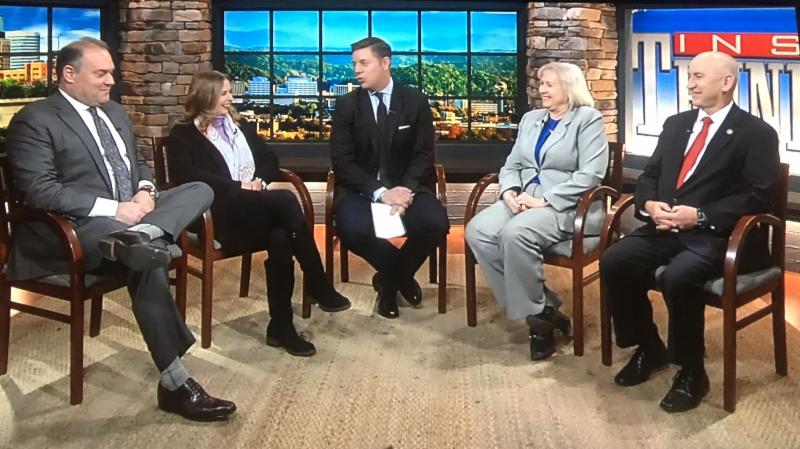The 110th General Assembly has returned for the second week of legislative action. This week there was focus on juvenile justice reform, Tennessee’s Higher Education Commission Review, a look at voter safety in Tennessee, and two new appointments.
Juvenile Justice Reform – The Senate Judiciary Committee reviewed a report delivered by the Tennessee Blue Ribbon Task Force on Juvenile Justice. The task force was created last year at the request of Governor Bill Haslam, Tennessee Supreme Court Chief Justice Jeff Bivins and other key justice system stakeholders to conduct a data-driven review of Tennessee’s juvenile justice system. The report made evidence-based policy recommendations to protect public safety, more effectively hold juvenile offenders accountable, contain costs, and improve outcomes for youth, families and communities. Presently there are over 1,100 youth in the custody of the Tennessee Department of Children’s Services for unruly or delinquent offenses. Key recommendations of the task force are being drafted for inclusion in Governor Bill Haslam’s legislative package which he will deliver to lawmakers later this month. It is projected that these recommendations, if enacted, would reduce the number in custody by 36% by 2024 and save an estimated $36 million over five years.
Tennessee Higher Education Commission– The Tennessee Higher Education Commission (THEC) Executive Director Mike Krause appeared before the Senate Education Committee this week to report on the state of higher education. The progress check-up showed Tennessee students are leading the nation in tapping into federal student aid. At a time when the rest of the nation is wondering what to do about mounting student debt, the report showed the number of students taking out loans in Tennessee has decreased by 17 percent.
The Tennessee Promise Scholarship, which is now a model nationwide, is key to this success. It has helped increase our “college going rate” from 53.8% in 2007 to 62% today.
Tennessee’s Voting System – Although Tennessee’s voting system is secure, election officials are working tirelessly to guard against cyber-attacks or other potential breaches according to Secretary of State, Tre Hargett and State Election Coordinator, Mark Goins who appeared before the Senate State and Local Government Committee this week. The officials, along with the Department of State’s technology specialists, outlined measures they have taken to ensure the integrity of elections in Tennessee.
New appointments – Lt. Gov. Randy McNally appoints Senator Haile as Speaker Pro Tempore and Senator Bowling as Deputy Speaker
Back in Knox County

Knoxville area legislators participated in a forum sponsored by the Society of Professional Journalists.
Teacher Preparation Programs – Tennessee Higher Education Commission (THEC) Executive Director Mike Krause told lawmakers on the Senate Education Committee this week that nearly half of all teacher preparation programs in the state’s colleges and universities are in the two lowest performance categories for effectiveness. Troubling trends include: underperformance of academic standards for teacher candidates (ACT score below 21), teacher candidates not receiving high-need licensure endorsements, lack of diversity in teacher candidate pool, and low Tennessee Value-Added Assessment System (TVAAS) performance of recent graduates. Krause said THEC will be taking aggressive action to correct these issues. The General Assembly is expected to take up legislation this year to improve the programs.
Pill Take Back Program – Tennessee’s Household Pill Take Back Program resulted in the disposal of 162,988 pounds of pills according to TBI Special Agent Tommy Farmer who appeared before the Senate Finance Committee’s Appropriation Subcommittee on Wednesday. Farmer said a total of 237 collection bins are available in Tennessee’s 95 counties. The program provides a way for unused prescription drugs to be safely disposed. This helps prevent prescription and over-the-counter medications from getting into the hands of children and into the waterways. The program also makes sure that the pills are disposed of in a safe, environmentally-friendly manner.
Meth Labs – The Tennessee Dangerous Drugs Task Force helped in the seizure of 211 meth labs in Tennessee last year. The meth seized amounted to 3,040 pounds of hazardous waste transported for disposal. The occurrence of meth labs seizures has been decreasing for several years in Tennessee. They reached their peak in February of 2013 when they were being reported at a rate of seven a day. Since passage of the I Hate Meth Act of 2013, meth labs have decreased to an average of one every 48 hours.
Student Veterans — Retired Lt. Gen. Keith Huber spoke to the Tennessee Senate Education Committee this week about his work in helping Middle Tennessee State University (MTSU) better serve their student veterans. Lt. Gen. Huber said Tennessee is seeing great progress in enrolling and supporting veterans in higher education, but still has room for growth in providing funding and facilities, including veteran’s centers on the state’s college campuses. MTSU President Sidney McPhee and Lt. Gen. Huber worked together to design, build, equip, and staff the 3,200 sq. ft. Charlie and Hazel Daniels Veterans and Military Families Center on that campus. It is the only university veteran’s center in the nation to have two full-time Veteran Affairs -funded employees. At the center, there is an employer-search agent that works with student veterans to help find them internships and careers after graduation. The number of GI Bill users at Tennessee institutions has increased 116% from 5,024 in 2007 to 10,852 in 2017, and there are 22 VETS Program certified higher education institutions in the state. An institution receiving VETS Campus certification not only prioritizes outreach to veterans, but successfully delivers the services necessary to create a supportive environment where student veterans can prosper while pursuing their education.
Senate Finance Committee hears report regarding TBI’s financial operations —
The Senate Finance, Ways and Means Committee (to which I was recently appointed) heard testimony this week from the Tennessee Comptroller’s Office regarding their recent special report examining certain financial operations of the Tennessee Bureau of Investigation (TBI). The special report was initiated as part of the 2017 Appropriations Act to ensure that the agency’s fiscal practices are working in the most efficient and effective manner. The Comptroller’s Office concluded that TBI and the Department of Finance and Administration should commit to improve communication during the budget process. On the agency’s airplane, the Comptroller’s office found that more cost-effective measures could have been used even though procurement policies were followed. Additionally, the Comptroller’s Office researched the history of TBI and performed an analysis of TBI’s independence. TBI is an operationally independent cabinet-level agency that does not clearly belong to a single branch of government.
Tennessee Blue Book

The new Tennessee Blue Books are in. This book serves as a manual of useful information on our state and government, both past and present. It contains information on the makeup of Tennessee state government, state history, national and state constitutions, most recent election results, and census data. It you would like a copy, please contact my office by emailing sen.becky.massey@capitol.tn.gov.
Also, if I can be of any help, please either email me or call my office at 615-741-1648.


